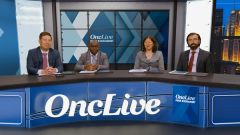
2L Dosing Considerations and Management Strategies for SCLC
Expert oncologists discuss important dosing considerations and treatment management strategies for lurbinectedin and other second-line therapy approaches in small-cell lung cancer.
Episodes in this series

Transcript:
Taofeek K. Owonikoko, MD, PhD: Dr Sands, let me come back to you. We’ve talked about accelerated lurbinectedin from the LAGOON trial, the dose that was approved, and then some of the different doses that have been tested. What’s your take on the real impact of the dose efficacy of lurbinectedin?
Jacob Sands, MD: The dose that was approved is 3.2 mg/m2. And I highlight that because we have the other trials where the dose is 2 mg/m2. We saw that in combination with doxorubicin, it did not beat topotecan or CAV [cyclophosphamide, doxorubicin, and vincristine]. Not beating them means the curves were pretty overlapping, although the tolerability was maybe a bit better, but that is not being pursued further. One question about that is, would patients do better on the lurbinectedin at 3.2 mg/m2? And was the 2 mg/m2 just a lower dose where you are not going to get the same kind of efficacy? Now of course, we don’t have a comparison of those, but that is something that makes me more hesitant about dose reduction, unless it’s needed. There are certainly patients where we have to dose reduce, so I’m not at all saying don’t. But there are other ways to support patients, if someone did not get G-CSF [granulocyte colony-stimulating factor] for example, as prophylaxis with lurbinectedin, we knew that the neutropenia rate was quite high, but those patients were not allowed to get primary prophylaxis. So, in someone where that’s a reason, I would not dose reduce, I would give them prophylaxis to help maintain that dose, for example, when possible.
Taofeek K. Owonikoko, MD, PhD: Dr Leventakos, when you have a patient on lurbinectedin, what type of adverse effects do you worry about, and how do you anticipate and manage them?
Konstantinos Leventakos, MD, PhD: I think that being trained with topotecan and now working with lurbinectedin, I feel the toxicity profile, we were ready for something worse, but it’s quite manageable hematologic toxicity. Mainly I would focus on the anemia, thrombocytopenia, and neutropenia. But with the growth factors, I think at least we have fewer febrile neutropenias that are clinically significant. Otherwise, I think we see the same classic profile of chemotherapy issues, like fatigue and asthenia. But otherwise, I feel that the main differentiator of the second line coming out of the topotecan ere was a better hematologic toxicity profile and a little more manageable. Sometimes patients might complain about some muscular symptoms, but all of these are quite manageable. When it comes to monitoring for the symptoms, I think that in someone who has developed some cytopenias, I might check to see how the nadir is going, but here I have not changedmuch my monitoring on lurbinectedin.
Jacob Sands, MD: One other thing to add, what we don’t talk a lot about with the toxicity profiles is the schedule. The Q3 [every 3]-week schedule, I think it’s really appealing for patients. I tend to use irinotecan more so than topotecan, and irinotecan being day 1, day 8 of a 21-day cycle, so it’s not overwhelming, and by no means is that a deterrent. But a Q3-week dose, I think is appealing for patients if they’re not having a lot of toxicities that require coming in further. That’s not something that shows up so much in the table of an adverse effect profile.
Taofeek K. Owonikoko, MD, PhD: That’s important. I think the schedule is important in terms of patient quality of life. We at times forget that having patients come back repeatedly for infusions or assessment of toxicity can really impact their quality of life, over and above the impact of the disease itself. I think that’s an important factor you brought up.
Transcript edited for clarity.





































